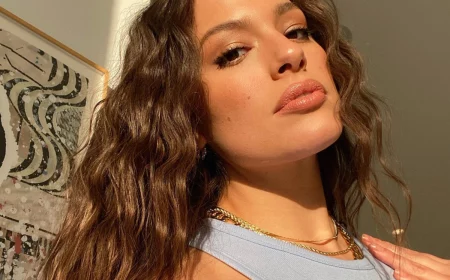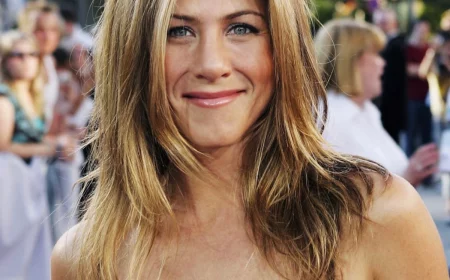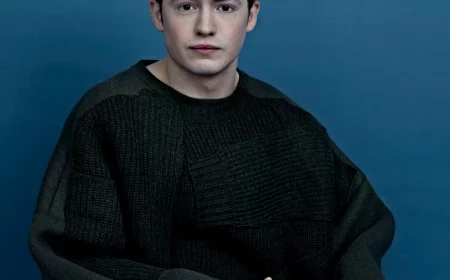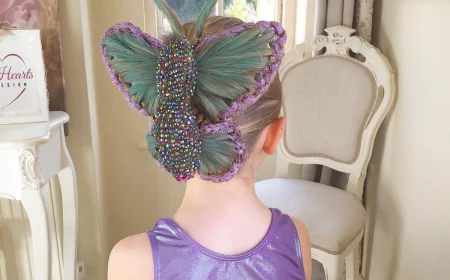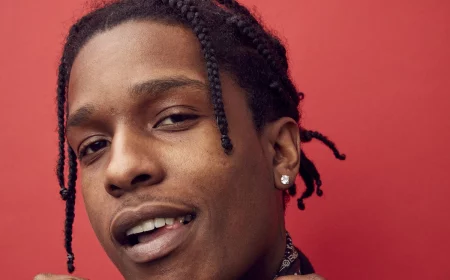Thinking of Growing Your Hair Out? Here’s What Nobody Tells You
You know, after years behind the barber’s chair, you start to see the tides change. For a long time, it was all about sharp fades and super clean undercuts. But lately, more and more guys are walking in with a different look in their eyes. They’re tired of the constant upkeep. They want hair with some life to it—something with movement and character.
In this article
Honestly, I love it. This shift toward mid-length hair opens up a world of creative, personalized styles. But here’s the real talk: just stopping your haircuts isn’t a plan. It’s a recipe for disaster.
Growing your hair out is a journey, and like any good road trip, there are some pretty frustrating parts. I’ve coached hundreds of guys through it, and I’ve seen so many of them get this close to their goal, only to give up and buzz it all off in a moment of weakness. This guide is everything I tell them in the chair to get them through it successfully.

First Things First: Get to Know Your Hair
Before you even think about skipping your next haircut, it pays to understand what you’re working with. Knowing your hair’s basic qualities isn’t just trivia—it’s the single most important factor in figuring out how to care for it and what styles will actually look good on you. It’s the first thing I check in any consultation.
The Growth Game: A Lesson in Patience
Let’s set some real-world expectations. Hair grows, on average, about half an inch a month. That’s it. So, getting from a short clipper cut to hair that actually has some flow can easily take a year, sometimes more. It grows in its own cycle, with some hairs growing while others are resting or shedding, which is why it never grows in a perfectly even sheet.
Here’s a rough timeline of what to expect so you don’t lose your mind:

- Months 1-3: The Puffy Phase. Your hair loses its sharp shape and starts to look… round. The sides start to stick out. This is the first test of your resolve.
- Months 4-7: The Awkward Stage. Welcome to the main event. It’s too long to style short, but too short for the styles you want. It’ll stick out in weird places and you will question your life choices. We’ll talk about how to survive this, I promise.
- Months 8-12: The Vision Starts to Appear. You can finally start to see the shape you were aiming for! It has weight, it has movement, and you can finally start trying out some real styles.
Patience is your best friend here. Seriously.
Hair Type Isn’t Just “Straight” or “Curly”
When I talk about hair type, I’m looking at a few key things that tell me how your hair is going to act when it gets longer.

- Density: This is simply how many hairs you have on your head. If your hair is low-density (we sometimes call this thin), longer styles might look a bit limp. The fix? Clever layering can create an illusion of fullness. If you have super high-density (thick) hair, you’ll probably need some weight taken out to avoid the dreaded “helmet head.”
- Texture: This is about how thick each individual strand is. Fine hair is delicate and gets weighed down easily by heavy products. Coarse hair is thicker, stronger, and often thirstier for moisture.
- Porosity: This is a big one. It’s about your hair’s ability to absorb moisture. You can do a quick test. Pluck a clean, dry strand of hair and drop it in a glass of water. If it sinks right away, you have high porosity hair—it sucks up water (and product) but can lose it just as fast, leading to frizz. If it floats for a long time, you have low porosity hair, meaning the cuticle is sealed tight and it can be hard for moisture to get in.
Quick tip: Okay, so you did the porosity test. Now what? If your hair sank (high porosity), look for products that say “repairing” or “moisturizing.” Your hair is thirsty! If it floated (low porosity), you’ll want lighter, water-based products that won’t just sit on top and cause buildup.

The Journey: How to Actually Grow Your Hair Out
This is where the rubber meets the road. That in-between phase can feel messy and unprofessional, but you can absolutely manage it without resorting to wearing a hat 24/7 (though that works in a pinch!).
Surviving the Awkward Stage
First, just accept that it’s going to happen. I had this one client, an attorney, who was on the verge of quitting three times. His hair was sticking out at the sides, and he felt like he looked like a mess in court. We got him through it. The key was a light-hold styling cream. It helped tame the wildness without making his hair feel stiff or looking greasy.
A go-to style for this stage is the
Inspiration Gallery



That awkward stage where your hair has a mind of its own can be tamed. The secret weapon? A good hat or beanie is your best friend, but don’t just jam it on. Before you put it on, style your hair roughly in the direction you want it to fall. When you take the hat off, your hair will have a more controlled shape instead of a chaotic, flattened mess.



- Reduced stripping of natural oils
- Less frizz and better curl definition
- Maintained moisture and shine
The secret? Washing your hair less often. As your hair gets longer, the scalp’s oils take more time to travel down the shaft. Aim for washing every 2-3 days instead of daily, using a quality co-wash or sulphate-free shampoo like Briogeo’s Be Gentle, Be Kind on off days.



The average man has about 100,000 hair follicles on his scalp, but not all of them are active at the same time.
This is why growth can seem patchy or uneven. Some areas, like the nape and sides, may appear to grow faster because the starting length was shorter. Patience isn’t just a virtue; it’s a biological necessity in this process. A good stylist can help even things out during maintenance trims without sacrificing overall length.



How do I get that effortless, beachy texture without actually hitting the surf?
Sea salt spray is your answer. It mimics the effect of saltwater, adding grip, volume, and a matte finish to your hair. Lightly mist it onto damp hair and scrunch it with your fingers as it air-dries or while using a diffuser. Brands like Bumble and bumble’s Surf Spray or the more affordable Not Your Mother’s Beach Babe texturizing spray are perfect for this.



The Biggest Mistake: Using way too much product. With longer hair, a little goes a long way. Start with a pea-sized amount of clay or cream, warm it between your palms until it’s nearly invisible, and then apply it from back to front, starting at the roots. You can always add more, but you can’t easily take it away without a full re-wash.



- Don’t use scorching hot water, which strips oils and can damage the follicle.
- Don’t scrub aggressively with a towel; gently pat and squeeze to dry.
- Don’t apply conditioner to your scalp; focus on the mid-lengths and ends where hair is oldest and driest.
- Don’t skip conditioning entirely. It’s the key to preventing tangles and breakage.



Navigating the world of styling products can be daunting. Let’s simplify two popular choices.
Matte Clay: Best for creating textured, pliable looks with zero shine. It offers a strong, flexible hold that’s perfect for messy, voluminous styles. Think Hanz de Fuko’s Claymation.
Shine Pomade: Ideal for slick, classic looks like a side part or a slick-back. It provides a wet, high-gloss finish. American Crew’s Pomade is a timeless choice for this polished vibe.
Choose based on the finish you want: natural and textured, or sharp and shiny.



“I see so many guys trying to force their hair into a shape it doesn’t want to be. The best modern styles come from a conversation with your hair’s natural texture, not a fight against it.” – Aaron Grenia, Co-founder of IGK Hair Care



Embrace the power of airflow. The way you dry your hair can completely change its final shape and volume. For a boost, blow-dry your hair upside down, directing the heat at the roots. To control it, use a nozzle and dry it in the direction you want it to lay. Always finish with a cool shot of air to lock the style in place.



What’s the deal with leave-in conditioner? Is it really necessary?
Absolutely, especially for hair that’s prone to dryness or tangles. Think of it as a moisturizer for your hair that works all day. After showering, on damp hair, a few spritzes of a lightweight leave-in like It’s a 10 Miracle Leave-In will make combing easier, protect from heat, and reduce frizz without weighing your hair down.



A simple change in your part can dramatically alter your look. The classic side part can look professional and intentional, while a center part can give off a more relaxed, ’90s-inspired vibe. Don’t feel locked into one. Experiment by parting your hair while it’s wet and seeing which flatters your face shape the most. The best part? It costs nothing to try.



- Eliminates split ends that can travel up the hair shaft.
- Helps maintain a shape so the ‘awkward stage’ looks more intentional.
- Can actually make hair appear thicker and healthier at the ends.
The key is a ‘maintenance trim’ or ‘dusting’ every 8-12 weeks. Be explicit with your barber: you’re growing it out and only want the bare minimum taken off to keep it healthy.



Don’t underestimate the power of accessories. The right hair tie is crucial. Avoid standard office rubber bands or ties with metal clasps, which will snag and break your hair. Invest in a pack of seamless fabric ties or, even better, spiral coil ties like the Invisibobble. They hold hair securely without creating harsh dents or causing damage.



According to Google Trends, searches for “curtain hairstyle,” a classic mid-length look, have increased by over 300% in the last five years.
This shows a clear shift away from the high-and-tight military cuts toward softer, more expressive styles. Icons like Timothée Chalamet and K-Pop stars have made this approachable, ’90s-esque look a modern staple, proving that what’s old is new again in men’s grooming.



Straight Hair: Tends to get oily faster and can look flat. Use volumizing shampoos and light products like mousse or texture spray to add body.
Wavy Hair: The sweet spot for many mid-length styles, but can be prone to frizz. A defining cream and a ‘no-touch’ air-dry policy are your best bets.
Curly Hair: Requires maximum moisture. Use curl-specific creams, like Shea Moisture’s Coconut & Hibiscus Curl Enhancing Smoothie, and avoid over-washing to keep coils defined and healthy.



Healthy hair starts with a healthy scalp. If you’re experiencing flakiness or buildup from using more products, consider a gentle scalp scrub once a week. Products like Briogeo’s Scalp Revival or The Inkey List’s Salicylic Acid Exfoliating Scalp Treatment can clear follicles, reduce itchiness, and create a better environment for strong growth.



There’s a reason Keanu Reeves’ mid-length hair is iconic: it looks effortless. The key is a great cut that builds in layers and removes weight, allowing the hair to move naturally. It’s not just grown-out hair; it’s a strategically shaped style that works with his texture, proving that the right cut is the foundation for low-maintenance cool.



- Get incredible volume at the roots.
- Achieve a more natural, less ‘styled’ finish.
- Product gets distributed more evenly.
The technique? Applying your styling product when your hair is still slightly damp, not bone dry. This allows the product to blend with the hair’s natural moisture, providing a more effective and integrated hold as it finishes air-drying or you blow-dry it.



My hair is fine and just looks limp when I grow it. What can I do?
The trick is to build volume without weight. First, ask your stylist for hidden layers to create movement. Second, use a volumizing mousse, like L’Oréal’s BOOST IT Volume Inject Mousse, applied at the roots on damp hair. Finally, when you blow-dry, focus on lifting the roots with your fingers. This combination creates a foundation of fullness that lasts.



Your pillowcase could be sabotaging your hair. Cotton fibers can be rough, causing friction that leads to frizz and breakage overnight.
Consider switching to a silk or satin pillowcase. The smooth surface allows hair to glide, reducing tangles and morning bedhead. It’s a small change that makes a noticeable difference in the health and manageability of longer hair.



The ‘Bro Flow’ is more than just a phase; it’s a legitimate style. Characterized by hair that’s long enough to be pushed back off the face but still has movement, it requires a product with a light, flexible hold. A grooming cream or styling lotion is perfect. Apply a small amount to damp hair and use your fingers to push it back and to the side as it dries for that perfect, casual flow.



Wide-Tooth Comb: Your number one tool. Use it on wet hair post-shower to gently detangle without stretching or breaking the strands. Always start from the ends and work your way up to the roots.
Standard Brush: Use sparingly, and preferably on dry hair. Boar bristle brushes are excellent for distributing natural oils from the scalp down the hair shaft, adding shine and smoothness.



Face shape can guide your style choice. A longer, pushed-back style can complement a round or square face by adding height. Conversely, if you have a longer or more oval face, a style with more width on the sides or some fringe, like curtains, can create a sense of balance. It’s all about creating flattering proportions.



- 1 cup of warm water
- 1 tablespoon of sea salt (not table salt)
- 1 teaspoon of argan or coconut oil (for hydration)
- A few drops of your favorite essential oil for scent (optional)
Mix these in a spray bottle for a DIY sea salt spray. It’s a budget-friendly way to get that coveted texture and volume without the price tag of high-end brands. Shake well before each use.

One key insight: Learn to love the texture you have. If your hair is wavy, stop trying to flat iron it into submission. If it’s dead straight, embrace sleek looks instead of fighting for curls that will fall in an hour. The most successful long-hair journeys happen when you work *with* your hair’s nature, not against it. That’s the secret to hair that not only looks good but feels authentic to you.

